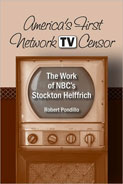 |
America's First TV Censor:
The Work of NBC's Stockton Helffrich by Robert J. Pondillo Southern Illinois University Press
book review by Marjetta Geerling
"Censorship is and always has been a phenomenon clearly power based, driven by both peril and preservation."
In his thorough and thought-provoking examination of Stockton Helffrich's censorship work for NBC during the Golden Age of network television, Robert Pondillo presents a complex understanding of both Helffrich himself and the many, often conflicting, cultural, religious, and political influences at work in the 1950s. As Pondillo notes in the conclusion, "That which is censored helps us understand the confluence of elaborate social issues and power arrangements at particular moments in time." America's First Network TV Censor, then, stands as more than a look at the history of network censorship. It captures the essence of what Americans were most anxious about in the post-WWII era and shows who and what shaped the public handling of sensitive issues.
Some of the issues at stake are familiar to TV viewers today. Concerns about TV's influence on children, excessive violence, use of profanity, and the handling of sexual content were all situations Helffrich was called upon to handle in scripts and advertising. Concerns like the debate on how, or even if, toilet paper and deodorants should be advertised on television are humorous to the modern viewer. His commendable stands on the handling of mental illness and recommendation to integrate television shows long before other networks considered these issues make Helffrich's work unusually progressive for his time. His push for truth in advertising and his evolving censorship stance illustrate his personal belief that, "Isnt it true that almost anything can be said or done if it's said and done with good and honest intent?"
Pondillo's careful scholarship reveals the intriguing depth of Helffrich's character and how his personal beliefs intersected with social, political, and religious influences to shape the development of TV censorship. The clear prose and relevant examples make America's First TV Censor: The Work of NBCs Stockton Helffrich an enjoyable and fascinating read.
